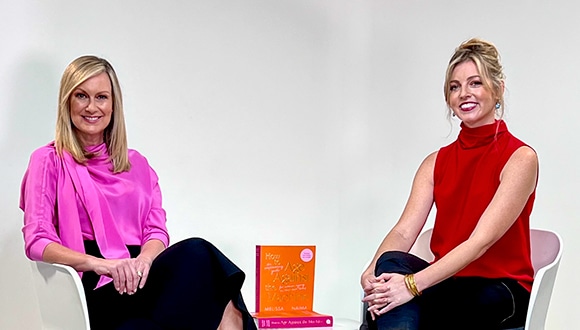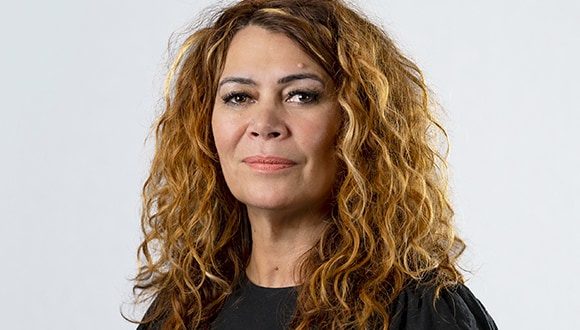4 Australians empowering women to age well
Published March 2024 | 5 min read
Expert contributors Melissa Doyle, journalist; Naima Brown, author; Antoinette Braybrook, CEO of Djirra; Emeritus Professor Julie Byles, head of the International Longevity Centre Australia
Words by Lucy E. Cousins
This International Women's Day, four inspiring Australians share their insights on women’s health, growing older and the fight against ageism.
We all start ageing from the minute we're born, with the goal to live a long and happy life, so why does it suddenly become so problematic when women reach a 'certain age'?
That's a question many women are asking as our ageing population looks for ways to live well and embrace our older years as a 'second act'.
Over the past decade, the number of Australian women over 65 has steadily increased, with the median age now sitting at 39.4 years old.
"We're living longer and are fitter than ever, and our attitudes to getting older have changed," says journalist Melissa Doyle, co-creator of the podcast and book How to Age Against the Machine.
And yet, she says, we are told that ageing is something to avoid – a message reinforced by statistics that point to continued inequality and challenges for older women.
Sobering statistics on women's inequalities
The average full-time weekly wage for women is 16% less than men. On average they’ll have around 23% less superannuation at retirement age, and around one-third of single women aged over 60 are homeless or experiencing financial hardship. Females are also more likely to be diagnosed with an anxiety disorder.
Considering those numbers, it's only fitting that the theme of the 2024 International Women’s Day is #InspireInclusion – spotlighting the progress and struggle for women's equality.
To gain an understanding of what it means to be an older woman in Australia today – and what still needs to change – we spoke to four women who are working to improve the rights and experiences of our older generations.

Melissa Doyle and Naima Brown authors, of How to Age Against the Machine
"I'm still amazing and relevant and able to contribute, but just in a different way… I don't think we celebrate that enough and recognise just how bloody fantastic we still are and what we can do next."
As co-hosts of a podcast about getting older as well as the newly released book How to Age Against the Machine, ageing well is a cause Melissa Doyle and Naima Brown are fiercely passionate about.
"We're now surrounded by so many dynamic, older women who are still in the prime of their career and who have so much to contribute," explains Melissa, who’s just turned 54.
Naima, a journalist and filmmaker, says women have long been saddled with "cultural baggage around the cult of youth".
"However, we’re experiencing a kind of resistance or a backlash to this baggage, where we’re seeing more and more women reject those stereotypes about growing older," she says.
In researching for both their podcast and book, Melissa and Naima looked at the "sobering side" to ageing – in particular the inequality of the financial and educational situations of many Australian women – and it has made them both reflect on their own preparedness for getting older.
"The data around homelessness in women over 50 is shocking," says Naima, "but beyond homelessness, there's a vast difference between what ageing looks like for women who have to rely on what the government can provide, versus if you're able – and lucky enough – to try to plan for those eventualities yourself."
The pair say that many of the women they spoke to had come to the realisation that getting older might require a "recalibration" of identity – they were no longer a mum or a career woman – or both.
"There's a kind of midlife audit to say, 'Well, I'm still amazing and relevant and able to contribute, but just in a different way. What do I do now?'," says Melissa. "I don't think we celebrate that enough and recognise just how bloody fantastic we still are and what we can do next."
How to extend the healthy years of your life
Australia has one of the highest life expectancies in the world. How can you extend your life expectancy? The top three changes you can make are to reduce your alcohol intake, be physically active for 30 minutes a day and eat a healthy diet. Find out more about extending the healthy years of your life.

Antoinette Braybrook AM, CEO of Djirra
"Feeling strong, connected and proud in cultural identity is key to improving Aboriginal women’s health."
Growing up as part of the only Aboriginal family in a small town, Antoinette Braybrook experienced extreme racism and discrimination, leaving school at the age of 15. Years later, after completing a law degree, she was offered the opportunity to establish Victoria’s first Aboriginal Family Violence Prevention & Legal Service – now called Djirra. She took on the role of inaugural CEO and, due to her unwavering focus on the health and wellbeing of Aboriginal women, she’s still there 21 years later.
"Djirra means everything to me. It's in my blood; it's who I am. My priority has always been Aboriginal women," she explains. "Following the devastating [Voice to Parliament] referendum outcome, I am driven more than ever to fight for the women in my life – my friends, my family, my nieces and the women we support."
Djirra works with Aboriginal and Torres Strait Islander people who experience, or are at risk of experiencing, family violence – 98% of Djirra's clients are women and their children.
"Health problems increase dramatically when there's family violence, with Aboriginal women 32 times more likely to be hospitalised due to family violence," says Antoinette.
As a result, she adds, Aboriginal women are disproportionately impacted by emotional and social wellbeing issues as they age.
"Aboriginal and Torres Strait Islander women have a life expectancy eight years less than other [Australian] women," she says. "We’re over-represented across all major categories, including cardiovascular disease, hypertension, diabetes, kidney disease and others."
Antoinette says that despite the negative attitudes and inequality still faced by Aboriginal people to this day, the “strength, courage and resilience” of Aboriginal women remains strong.
"Feeling strong, connected and proud in cultural identity is key to improving Aboriginal women’s health [as they age]," she says. "We see Djirra women thrive when they have access to culturally safe, non-judgemental spaces like ours."
Get support for people experiencing domestic violence
At HCF, we believe everybody has the right to be free from violence and feel safe and respected in their homes. If you’re experiencing domestic violence, we can help by offering payment options during times of financial hardship and connecting you to relevant mental health and wellbeing support.

Emeritus Professor Julie Byles AO, Head of the International Longevity Centre Australia
"There's a new older, bolder you just around the corner. I know because over 10,000 women in their 70s told me so."
As a trained doctor with a PhD in Behavioural Science, Professor Julie Byles has a self-described "career-long fascination" with how women navigate and bring their inner strengths and resourcefulness to their older years. Not only is she the author of numerous books and studies on ageing, she’s also on the team of professors who run the ongoing Australian Longitudinal Study on Women’s Health, a population-based survey of over 57,000 Australian women that began in 1996. Prof Byles has a particular interest in women aged 70 and over, and what she’s learned has surprised her.
"Health statistics can paint a bleak picture of older age, but the women in our study told us a completely different story," she says. "Throughout my career, the women have continued to join the ongoing battle against ageism."
Interestingly, she adds, the worst form of ageism is sometimes the prejudice against ourselves as we age.
"I’ve learned that we need to embrace ageing, not fight it; and to anticipate and respond to the changes in our lives [as they happen]," she explains.
Prof Byles herself has now become a proud "card-carrying senior citizen", and though still working at the top of her field, she often reflects on what her studies have taught her about ageing well.
"It’s important to be kind to yourself as your body goes through these changes; don’t see them as the inevitable onset of decline or fragility," she advises. "There’s a new older, bolder you just around the corner. I know because over 10,000 women in their 70s told me so."
Over 60? Make sure you book in these health checks
The age of 60 may be the new 50, but it still comes with a few more recommended regular health checks for women. Here are some routine tests to book in.
Menopause Matters podcast
Going through menopause is an inevitable part of life for most women. Join Menopause Matters podcast host Alison Brahe-Daddo as she shares a delightfully hilarious and informative chat about the unexpected upsides of life after menopause with Puberty Blues author, Kathy Lette, and comedian, actor and author of You’re Still Hot to Me, Jean Kittson.
related articles
Health checks for women over 60
You might be feeling in your prime, but these routine health checks could be key to living a long and healthy life.
The mental toll of menopause
While this stage of life brings with it physical challenges, it can also have repercussions for your mental health. Here’s why, and how you can feel better.
Funding for ageing well
Find out how the HCF Research Foundation is turning innovative research projects into practical solutions for ageing Australians to live stronger and healthier lives.
Tips for healthy ageing
Your lifestyle can impact how fit and well you feel as you age. Here are the science-backed ways to feel happier, fitter and stronger for longer.